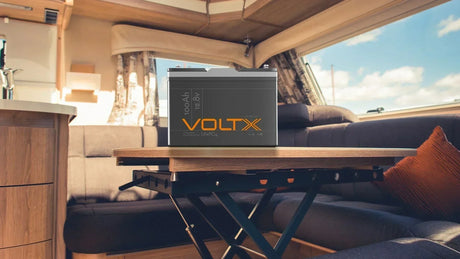Lithium batteries were invented and developed in the 1970s and 80s and have totally changed the way we use many electrical appliances. It's only recently though, that the advantages of lithium battery technology have begun to be available to motorhomes, caravanners, boaters, and anyone who relies on 12V batteries for powering appliances.
The difference in performance between a lithium battery and a traditional lead-acid battery is so great that anyone who is serious about staying off-grid in their vehicle or boat really has to consider installing one. It can only be a matter of time before lead-acid batteries are consigned to the proverbial dustbin of history.
Let's get one thing clear to start with: there are several different types of lithium batteries and the ones that are used as auxiliary/leisure batteries are very different indeed from those used in mobile phones and cordless electric tools. Lithium batteries have a reputation for catching fire without warning but the batteries that we are looking at here are completely safe in normal use. These are lithium iron phosphate batteries, often referred to as LiFePO4 batteries, and here are some of their advantages over traditional lead-acid batteries:
Voltage remains constant for much longer during discharge.
LiFePO4 batteries maintain their voltage throughout their discharge cycle, down to as low as 5% state of charge.
A much higher charging rate and faster charging vary according to the charging system used.
Because LiFePO4 batteries are able to accept a high rate of charge - over 100 Amps in some cases - they can be charged much more quickly. Even when it's almost fully discharged, a LiFePO4 battery can be safely charged up again much faster than a lead-acid battery. Just running the vehicle's engine for 20 minutes or so can put many hours' worth of charge back into the battery.
Can be discharged quickly without damaging the cells, making them ideal for use with inverters.
LiFePO4 batteries respond well to fast discharging with no adverse effects. This makes them ideal for use with inverters, especially when the appliances to be powered draw a lot of currents: coffee machines, induction hobs, microwave ovens, hairdryers, and toasters for example. This ability to reliably power 230V appliances without the need for mains hook-up is one of the main reasons that people install lithium batteries.
Can be discharged as much as 95% on average without damaging the battery.
Even when a LiFePO4 battery is discharged to well below 50%, it will continue to provide a high enough voltage to ensure that appliances operate correctly. *When it's been discharged by approximately 95%, a LiFePO4 battery with a good Battery Management System (BMS) will automatically shut down.
Thousands of charging cycles compared to just a few hundred from a typical lead-acid battery.
LiFePO4 batteries have a cycle life in the thousands and, again, the way the battery is used will have an effect. Also, of course, some LiFePO4 batteries are made with better quality cells than others and will have a greater cycle life. For most people, a LiFePO4 battery will last longer than the vehicle they're using it in.
A very low rate of self-discharge means they can be left unattended for months.
LiFePO4 batteries work in a completely different way from lead-acid batteries and don't suffer from sulphation. However, it's not recommended to leave a LiFePO4 battery in a discharged state as this could shorten the battery's useful life. Ideally, lithium batteries should be stored with a state of charge between 50% - 80%. The more gently you treat a lithium battery, the longer it will perform efficiently.
Zero maintenance is required.
LiFePO4 batteries are completely maintenance-free.





